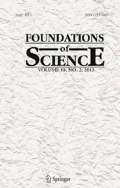Abstract
In this paper I will evaluate whether some knowledge states that are interpretatively derived from statistical mechanical probabilities could be somehow relevant in actual practices, as famously rejected by Albert (Time and chance, Harvard University Press, 2000). On one side, I follow Frigg (in: Ernst & Hüttermann (eds) Probability in Boltzmannian statistical mechanics, 2010) in rejecting the causal relevance of knowledge states as a mere byproduct of misinterpreting this theoretical field. On the other side, I will argue against Uffink (in: Beisbart & Hartmann (eds) Probabilities in physics, Oxford University Press, 2011) that probability-represented epistemic states cannot be explanatorily relevant, because (i) probabilities cannot faithfully represent significant epistemic states, and (ii) those states cannot satisfactorily account for why an agent should theoretically believe or expect something.
Similar content being viewed by others
References
Albert, D. Z. (2000). Time and chance. Harvard University Press.
Brillouin, L. (1962). Science and information theory. Academic Press.
Callender, C. (1999). Reducing thermodynamics to statistical mechanics: The case of entropy. Journal of Philosophy, 96(7), 348–373.
Denbigh, K. G., & Denbigh, J. S. (1985). Entropy in relation to incomplete knowledge. Cambridge University Press.
Dimitrijević, D. (2020). Causal closure of the physical, mental causation, and physics. European Journal for Philosophy of Science, 10(1), 1–22.
Duncan, T. L., & Semura, J. S. (2007). Information loss as a foundational principle for the second law of thermodynamics. Foundations of Physics, 37, 1767–1773.
Frigg, R. (2008). A field guide to recent work on the foundations of statistical mechanics. In D. Rickles (Ed.), The Ashgate companion to contemporary philosophy of physics (pp. 991–996). London: Ashgate.
Frigg, R. (2010). Probability in Boltzmannian statistical mechanics. In G. Ernst & A. Hüttermann (Eds.), Time, chance and reduction: Philosophical aspects of statistical mechanics (pp. 99–196). Cambridge University Press.
Hemmo, M., & Shenker, O. (2012). The road to Maxwell’s Demon. Cambridge University Press.
Hoefer, C. (2019). Chance in the World: A Humean Guide to Objective Chance. Oup Usa.
Jaynes, E. (1957). Information theory and statistical mechanics. Physical Review, 106, 620–630.
Ladyman, J., & Ross, D. (2007). Every thing must go. Oxford University Press.
Maxwell, J. C. (1878). ‘Diffusion’, Encyclopedia Britannica (9th edn., Vol. 7, p. 214). Reprinted in Maxwell (1952), pp. 625–646.
Muller, M. (2020). Undecidability and unpredictability: Not limitations, but triumphs of science. https://fqxi.org/data/essay-contest-files/Mueller_undecidability12.pdf
Norton, J. (2011). Challenges to Bayesian Confirmation Theory. In P. S. Bandyopadhyay & M. R. Forster (Eds.), Handbook of the philosophy of science, Vol. 7: Philosophy of statistics (pp. 391–440). New York: Elsevier.
Shenker, O. (2020). Information vs. entropy vs. probability. European Journal for Philosophy of Science, 10(1), 1–25.
Sklar, L. (1993). Physics and chance: Philosophical issues in the foundations of statistical mechanics. Cambridge University Press.
Stapp, H. (2010). Minds and values in the quantum universe. In P. Davies & H. Gregersen (Eds.), Information and the nature of reality: From physics to metaphysics (pp. 98–118). Cambridge University Press.
Timpson, C. G. (2013). Quantum information theory and the foundations of quantum mechanics. Oxford University Press.
Tolman, R. (1938). The principles of statistical mechanics. Philosophy of Science, 6(3), 381.
Uffink, J. (2011). Subjective probability and statistical physics. In C. Beisbart & S. Hartmann (Eds.), Probabilities in physics (pp. 25–49). Oxford University Press.
Walker, S., & Davies, P. (2016). The “hard problem” of life. In S. I. Walker, P. C. W. Davies, & G. F. R. Ellis (Eds.), From matter to life: information and causality. Cambridge University Press.
Wallace, D. (2016). Inferential vs. dynamical conceptions of physics. In O. Lombardi, S. Fortin, F. Holik, & C. López (Eds.), What is quantum information? (pp. 179–204). Cambridge University Press.
Author information
Authors and Affiliations
Corresponding author
Ethics declarations
Conflict of interest
The authors declare that they have no conflict of interest.
Additional information
Publisher's Note
Springer Nature remains neutral with regard to jurisdictional claims in published maps and institutional affiliations.
Rights and permissions
About this article
Cite this article
Anta, J. Ignorance, Milk and Coffee: Can Epistemic States be Causally-Explanatorily Relevant in Statistical Mechanics?. Found Sci 28, 489–505 (2023). https://doi.org/10.1007/s10699-021-09803-3
Accepted:
Published:
Issue Date:
DOI: https://doi.org/10.1007/s10699-021-09803-3



